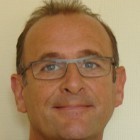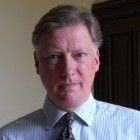Plenary B
For Future Teaching – The Plenary Debate: This House Believes Artificial Intelligence (AI) Could, Should and Will Replace Teachers
As artificial intelligence (AI) becomes increasingly ubiquitous and its use in applications in education and training becomes more commonplace, OEB`s expert speakers consider just how far AI can go. Could intelligent machines really replace teachers? Should they? Would AI or a robot do a better job? What would be the effect on learning and learners? If AI could do a better job than teachers, should it be allowed to? Or is there something fundamental about teaching that requires human interaction? And, if robots are already beginning to replace other professions, will teachers be replaced too?
Always one of the highlights of OEB, the debate is an opportunity for participants to discuss one of the most important issues of the day with our expert speakers. The parliamentary-style format encourages a lively exchange of views and allows plenty of time for audience participation. Let us hear your views and tell us whether the future of teaching belongs to AI or humans.

Christoph Benzmüller
Heisenberg Fellow of the German Research Foundation, Freie Universität Berlin & Heisenberg Research Fellow of the DFG, Germany
In 2012, Christoph Benzmüller was awarded with a Heisenberg Research Fellowship of the German National Research Foundation (DFG). In this position he is currently affiliated with Freie Universität Berlin, Germany, where he holds a venia legendi in Mathematics and Computer Science, and with Stanford University, CSLI/Cordula Hall, CA, USA. Previously, Christoph held positions as a full professor at the International University in Bruchsal, Germany, and as an Associate and Assistant Professor at Saarland University, Saarbrücken, Germany.
Christoph received his PhD (1999) and his Habilitation (2007) in computer science from Saarland University. His PhD, titled 'Equality and Extensionality in Higher-Order Theorem Proving', was supported by a grant of the 'Studienstiftung des Deutschen Volkes' and was partly conducted at Carnegie Mellon University, Pittsburgh, USA. Core research interests of Christoph include the theory, implementation, and application of reasoning systems for expressive logics, including classical and non-classical first-order and higher-order logics.
Christoph is well known for his automated higher-order theorem provers LEO-I and LEO-II. The latter system was developed in a project at Cambridge University, UK (2006-2007). Previously, Christoph has also been working at the boundry of computational logic, artificial intelligence, computational linguistics and computer-supported mathematics in several projects at Saarland University, the University of Birmingham, UK, and the University of Edinburgh, UK. The latest research activities of Christoph include the automation of various quantified non-classical logics logics as natural fragments of classical higher-order logic, and the automation of challenge aspects, in particular, modal contexts, in ontology reasoning. In the latter research Christoph cooperated with Articulate Software, Angwin, CA, USA (2008-2011). Recently, Christoph received major international recognition for his work (with B. Woltzenlogel-Paleo) on the formalization and automation of Kurt Gödel's ontological argument for the existence of God on the computer.
Christoph is trustee and vice-president of CADE (Conference on Automated Deduction), board member of AAR (Association of Automated Reasoning) and spokesman of the section Deduction Systems of the Gesellschaft für Informatik. He is editorial board member of the Journal of Applied Logic and the Logic Journal of the IGPL, and a permanent steering committee member of the User Interfaces for Theorem Provers workshop series. Moreover, he served as a trustee or steering committee member of several other conferences and he is an executive officer of The International Federation for Computational Logic (IFCoLog).
Prior to his academia career, Christoph Benzmüller was a successful long-distance runner at German national level.
Links
http://christoph-benzmueller.de

Donald Clark
eLearning Expert and Strategist, Plan B Learning, UK
Donald is an entrepreneur. He was CEO and one of the original founders of Epic Group plc, which established itself as the leading company in the UK e-learning market, floated on the Stock Market in 1996 and sold in 2005. Describing himself as ‘free from the tyranny of employment’, he now has a foot in two camps, one as an investor and Board member of PlanB learning, WiQi, LearningPool, Cogbooks, the other in the public sector as a Trustee for the University for Industry, City & Guilds and Deputy Chair of Brighton Arts Festival & Dome. He has been involved in consulting and implementing online learning in schools, FE, HE, corporate and government.
Donald has been involved in film, games, web, mobile, MOOCs, Oculus Rift and won many awards for the design and implementation of online learning. He is a regular speaker at national and international conferences, having delivered talks in the US, Europe, Far East, Middle East and Africa, and won several ‘Best speaker’ awards … also a regular (and controversial) blogger on online learning!
Links
http://www.planblearning.com/Bio/

Andrew Keen
Executive Director, Author and salonFutureCast, USA
Andrew Keen is one of the world’s best known and controversial commentators on the digital revolution.
He is the author of three books: Cult of the Amateur, Digital Vertigo and his current international hit The Internet Is Not The Answer which the London Sunday Times acclaimed as a "powerful, frightening read" and the Washington Post called "an enormously useful primer for those of us concerned that online life isn't as shiny as our digital avatars would like us to believe".
He is executive director of the Silicon Valley innovation salonFutureCast, the host of the popular Internet chat show "Keen On", a Senior Fellow at CALinnovates,a columnist for CNN and a much acclaimed public speaker around the world.
In 2015, he was named by GQ magazine in their list of the "100 Most Connected Men”.
Links

Nell Watson
Founder, Founder of Poikos, Belgium
Nell Watson is an engineer, entrepreneur, and futurist thinker who grew up in Northern Ireland. She has a longstanding interest in the philosophy of technology, and how extensions of human capacity drive emerging social trends.
Nell lectures globally on Machine Intelligence, AI philosophy, Human-Machine relations, and the Future of Human Society, serving as Associate Faculty at Singularity University.
She has had an unusual career, including teaching post-grad Computer Science at the age of 24, and later co-founding a successful Graffiti arts company. Her ability to bridge the world of technology and the Humanities makes it easy for her to translate complex subjects so that they can be clearly understood.
In 2010 Nell founded Poikos, a machine learning-driven ‘AI for for body measurement’. Nell’s patented technology ‘dematerialises’ the 3D body scanner, by providing accurate 3D scans of the body with only 2D camera hardware, such as that found within smartphones, or laptops. This may then be applied to a range of markets, such as mass customisation, and health.
Possessing a long-term mindset, Nell serves as Senior Advisor to The Future Society at Harvard, as well as serving as an advisory technologist to several startups, accelerators, and venture capital funds.
She is also Co-Founder of OpenEth, an ‘ethical explication engine’ that aims to crowdsource ethical heuristics for autonomous systems.
In her spare time Nell enjoys coding games, such as her startup life simulator, Founder Life. Founder Life attempts to teach the mindfulness and psychological habits necessary for entrepreneurs to consistently execute under pressure. She has also written two easily digestible books on philosophy – one for business leaders, and one aimed at children.
Moderator

Harold Elletson
Chairman, The New Security Foundation, UK
Dr Harold Elletson is an international communications and public affairs consultant. He is also the Director of The New Security Foundation, which conducts research into the implications of the new security environment for civil society. The New Security Foundation provides an international forum for dialogue between the public and private sectors and offers analytical insight and information about new security conditions. The Foundation hosts the Security and Defence Learning track at OEB, as well as organising other conferences and seminars. A particular area of expertise is tourism security and the connection between culture and security.
He is a founding director of the Africa Forum on Business, Investment and Security, a member of the steering committee of OEB, a member of the Organising Committee of eLearning Africa and a consultant to ICWE GmbH. He is also the editor of The eLearning Africa Report, which is published every year and contains a survey of ICT in education in Africa, a comprehensive country report outlining progress in ICT4E in every African country and a funding guide.
Dr Elletson was previously Director of the NATO Forum on Business and Security, which he created with support from the NATO Science Programme.
A former Member of the United Kingdom Parliament (from 1992-1997), he served as Parliamentary Private Secretary to the Secretary of State for Northern Ireland in the early stages of the peace process and was also a member of the Select Committee on Environmental affairs. He served as a member of the Lancashire Education Authority (the Education Committee of Lancashire County Council) before being elected to Parliament where he represented the interests of schools and colleges in his constituency in discussions with Ministers and on the floor of the House of Commons. He is a Fellow of the Armed Forces Parliamentary Scheme and of the Industry and Parliament Trust.
As a communications and public affairs specialist, he has advised many leading companies on aspects of their business in challenging markets, including BP in Azerbaijan and Alstom in Siberia. He has written widely on political and historical subjects and his first book, The General Against the Kremlin, was published by Little Brown. His journalism has been published in a variety of newspapers and magazines. Dr Elletson holds a PhD in Social Sciences from the University of Bradford.